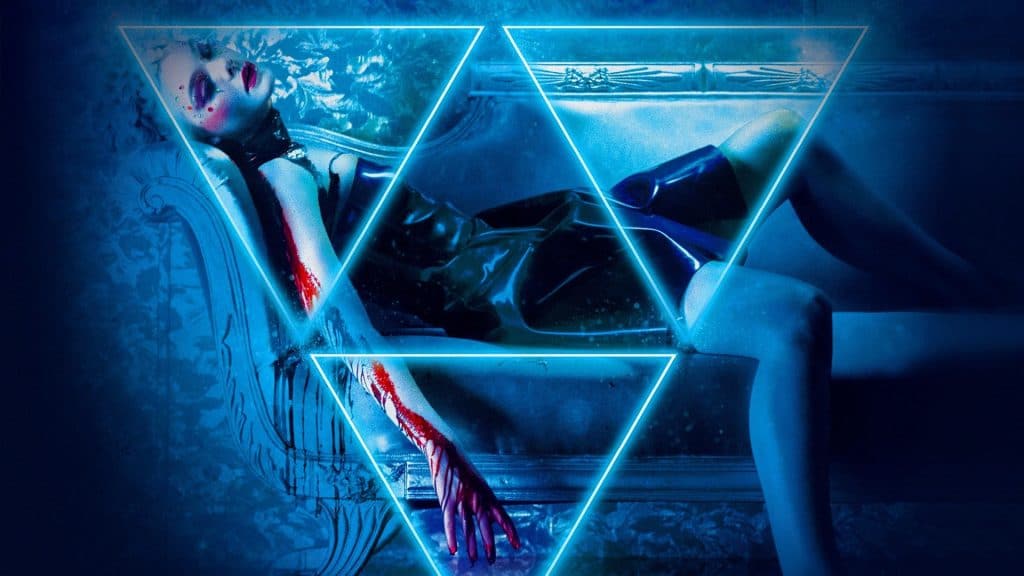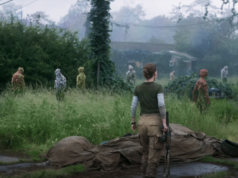Stunning, hypnotic and intoxicating, The Neon Demon is, however, a mess without structure, devoid of meaning and with no idea how to end
The Neon Demon (2016)
Directed by Nicolas Winding Refn. Screenplay by Nicolas Winding Refn, Mary Laws and Polly Stenham. Story by Nicolas Winding Refn. Starring Elle Fanning, Karl Glusman, Jena Malone, Bella Heathcote, Abbey Lee, Christina Hendricks, Keanu Reeves, Desmond Harrington and Alessandro Nivola.
I’m not a bit surprised to know from an interview with Elle Fanning that The Neon Demon was shot in chronological order and parts of it, including the ending, were created and improvised on set. I don’t know how much of it was made up as it went along but that sounds very reasonable considering the mess without structure that it turned out to be and how it derails into complete lunacy and style over substance, devoid of meaning and with no idea how to end. Which explains all the booing and jeering that it received at the Cannes Film Festival after the press showing.
And I say this as someone who did like (very much, in fact) Nicolas Winding Refn’s previous film, Only God Forgives (2013), which was also booed at the same festival three years before. Not that this movie doesn’t have its qualities, however. Visually, it is sometimes stunning, hypnotic and intoxicating like a dream — or a nightmare, suffused with strobe and neon lights, intense colors and pulsating electronic music. If Dario Argento had made Valley of the Dolls (1967), it would probably look like this.
Centered on a sixteen-year-old aspiring model named Jesse (Fanning) who has just moved to Los Angeles, The Neon Demon introduces us to a scary but titillating side of the fashion world, where plastic surgery is considered as essential as tooth brushing and where Jesse meets some beauty-obsessed models who become dangerously hostile towards her. Soon enough, she begins to realize the extent of her own beauty (“I don’t want to be like them. They want to be like me”) and how that strange universe is up to devour her along with her character.
As I said, The Neon Demon looks stunning, even if Natasha Braier’s cinematography exaggerates in its overuse of lens flares all over the place, like a futuristic piece. The mise-en-scène is also pretentious, with the actresses appearing in poses and more poses like objects whose sole function seems to be that of helping compose the movie’s gorgeous production design instead of de fact expressing something. If this is Refn’s way of exposing how vacuous this whole universe is, the least he could do is develop its characters as more than lifeless mannequins on the screen.
What we are left with is a lot of style and very little substance, even if the film can be as absorbing with its atmosphere as all of the beauty it shows us. But let’s not overlook one important element, which is how the film wants to convince us that Elle Fanning is too beautiful to be real. Not that this is a problem per se, she does have a ravishing, radiant face and sell us with her attitude this special alluring quality that could indeed leave a lot of people speechless — like in a scene where a fashion designer (Alessandro Nivola) is entranced when he sees her at a casting call.
But to say that she is so much of a goddess that even her mother used to call her “dangerous” — and to go as far as to compare her to the sun in the middle of winter — is perhaps a bit too much. If the role was played by someone like Marilyn Monroe, I would understand it. Being Elle Fanning, I find it not that easy to buy. Not that this is so important anyway. In a movie this full of flaws, it doesn’t really matter.
Plot-wise, The Neon Demon is a mess. Characters appear and disappear just like that, and subplots are discarded without any explanation. For instance, what is the nature of the mysterious person who tries to break into Jesse’s motel room? And who should he/she be? Does the dream scene that precedes this moment have anything to do with it, like a premonition? And what becomes of Jesse’s friend Dean (Karl Glusman)? I don’t even want to talk about how in the movie’s most climactic scene it goes from day to night in about less than a minute.
And if I mention all that it fails to accomplish, I can’t leave out the fact that Jesse is so poorly developed as a character to the point that her transformation into fully self-absorbed feels too forced and out of the blue, only illustrated by a strange neon symbol that changes from blue to red and leaves her enamored with her own reflection. It’s supposed to be stylish and dazzling; I get that. But it is also artificial and a cheap move to make us accept that she would quickly embrace narcissism and become a shallow mannequin like the women around her.
If all of that makes The Neon Demon frustratingly vapid, what can be said then about Refn’s silly attempt to shock us? He has done that before, yes — and with much better results — but now the way he tries to turn his narrative into a horror movie is of extreme bad taste, including a grotesque scene of necrophilia that is more gratuitous than anything else. The climax is so sickening that it would probably leave Elizabeth Báthory sexually aroused. I mean, what can possibly be said about a scene in which we see a woman gush out a river of blood from between her legs? I couldn’t even begin to contemplate a meaning for that.
Which is the main issue I had with this film, the fact that Refn wants to create something aesthetically gorgeous but has no idea what he wants to say in the first place or how to end it. Does he mean that in this superficial world and city all you can find is people trying to devour each other? And throw each other up? What the hell is that ugly last scene about? If his goal is to provoke us — which pretty much seems to be the case — he certainly did it. I’m only afraid that this was not the best way to achieve that and a lot of people will just hate him for it.




